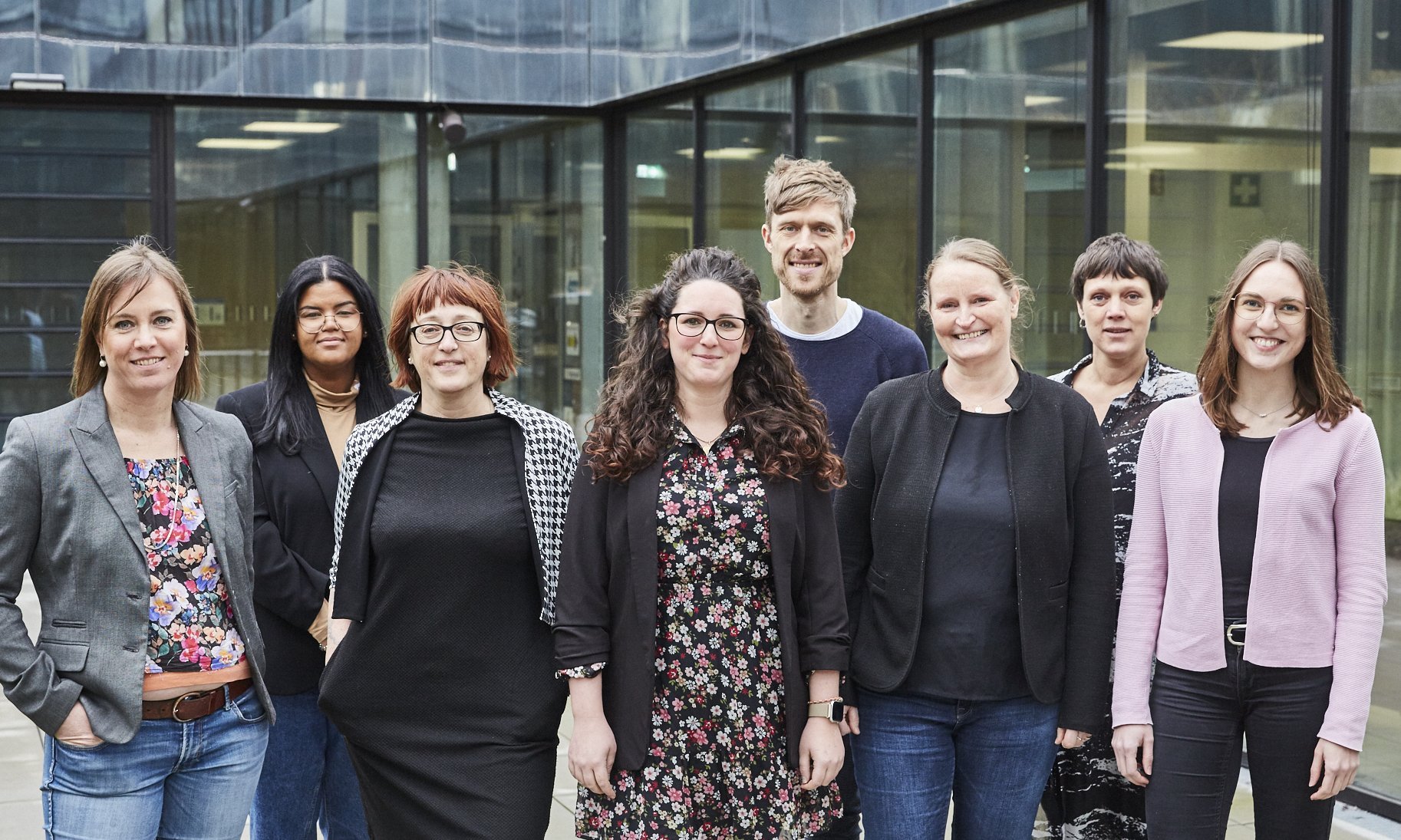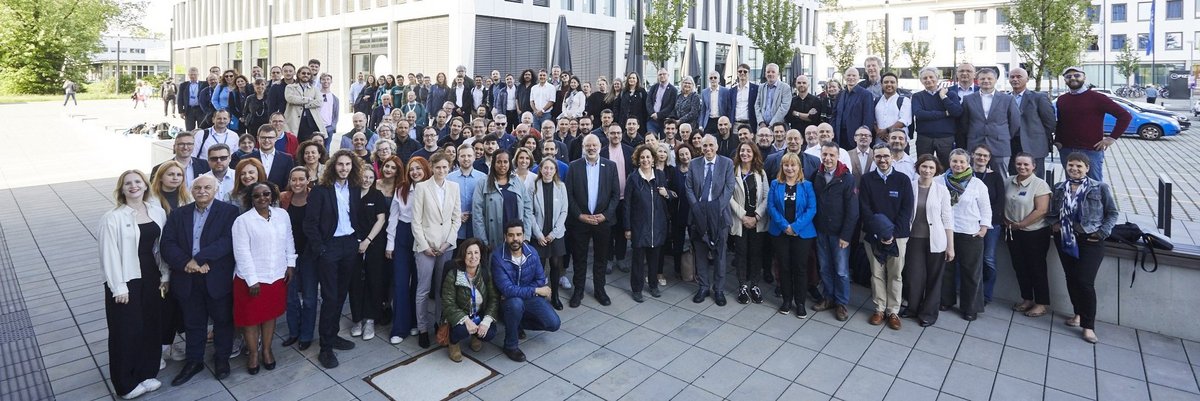More than 200 representatives of the nine EUT+-partner universities met at the Darmstadt University of Applied Sciences (h_da) last week (21 to 23 May 2024) to intensify their cooperation and take joint projects forward at European level. The meeting focused on the topics of research and sustainability.
By Christina Janssen, 27 May 2024
The Institute of Nanomaterials and Nanotechnologies (EUTINN) workshop is a good illustration of how research cooperation is progressing at the European University of Technology (EUT+). Seven EUT+ partners sent a total of 30 scientists to the meeting. The programme included a scientific conference, for which the institute has already published a Book of Abstracts, plus a poster session aimed at informal discussion, and laboratory tours. EUTINN researchers have already successfully acquired third-party funding for their projects at EU level, and are now planning more joint projects based on the meeting in Darmstadt. The subjects range from basic research in quantum chemistry to practical applications of nanomaterials in medicine and space travel. The nanotechnology group also wishes to integrate its teaching more intensively across all the campuses, in order to create the foundation for a joint degree programme in the medium term.
Establishing European research institutes
To drive forward research cooperation at European level, the EUT+ alliance is planning to found European research institutes in fields such as nanotechnology, data science and sustainability sciences. A lot of progress on the underlying regulations for establishing research institutes has been made in Darmstadt. This will provide the basis for the best possible exploitation of future synergies in the EUT+ alliance, for efficient project realisation and thus enhanced visibility of the EUT+ in Europe and around the world.
To this end, the EUT+’s Darmstadt Week included work on an overarching research strategy. An analytical tool presented in Darmstadt is to be used to identify future research trends. The next stage in preparing to found an EUT+ Graduate School will be to examine the potential common procedures for gaining doctorates. Options for doctoral students are also being planned at all the EUT+ universities in the form of online lectures, training courses, summer and winter schools, and more facilitation of mobility.
Sustainability – one of the EUT+’s core topics
One focal point of the Darmstadt-Week was sustainability. The EUT+ Sustainable Sciences Lab was represented by 40 participants from all nine EUT+ universities, who discussed key questions from their field with international experts. The thread running through the keynote speeches and discussion meetings was “Sustainability science: what’s in a name?” The ground covered ranged from fundamental topics such as the interactions between nature and culture to methods in sustainability sciences and all the way to specific questions about cooperating with politicians in order to promote science-based decision-making in our democracies. The programme also included short impulses and poster sessions. The participants said afterwards, “During our workshop the Sustainability Science Lab evolved from an idea into a community.”
A related panel discussion took place at the Schader Stiftung on the Tuesday evening of the EUT+ Darmstadt Week. It centred on the question of what specific challenges the green transformation brings for Europe. The EUT+ Green Office addresses these thoughts in a very practical way as one of its tasks is to implement a system that will measure “sustainability status” for the EUT+ alliance. A decision has now been taken to draw up the basis for this by means of a comprehensive analysis and by prioritising the individual topics relevant to sustainability for the EUT+ alliance.
EUT+ - an important voice on the European stage
After the official completion of the project “Joint European Degree Label in Engineering” (JEDI), which received funding from the European Commission, the EUT+ rectors turned their attention to the results and possibilities derived from it. The EUT+ and other university alliances had taken part in the project, which – like a series of other projects supported by the EU – aimed to develop common European university qualifications. Based on the results, the European Commission has now presented the “Blueprint for a European Degree”. The EUT+ views this as a huge success. The EUT+ alliance is generally regarded in Brussels as an important player when it comes to the ongoing development of the European Higher Education Area, according to the rectors at their meeting in Darmstadt. They added that this was also demonstrated by the fact that representatives of the EUT+ are regularly invited to join panel discussions and political events at European level.
More working groups and an excursion programme
The EUT+ Darmstadt Week included a meeting of representatives from architecture, media and environmental engineering, the working group on a common IT infrastructure, and the European Communications Office (ECOMO). The EUT+ Student Board, with representatives from six sites, met with members of ECOMO to discuss measures for boosting students’ commitment in the EUT+ alliance. The Communications Office also worked on the communication concept for the alliance, and on the EUT+’s printed publications and merchandising products. Two groups crystallised out of the ECOMO in Darmstadt which will be dedicated to social media work and development of the EUT+ corporate design.
At the social event on our Dieburg Campus on the Wednesday, all the guests had an opportunity to engage in informal networking while enjoying live music and Hessian delicacies. A campus tour was arranged for them to find out more about the Darmstadt Business School and the Faculty of Media at the h_da. On the Thursday the programme ended with an excursion to the GSI Helmholtzzentrum für Schwerionenforschung in Darmstadt.
Background
The nine EUT+ partner universities from all over Europe are working on a shared vision of a new type of university – the “European University”. The European University of Technology (EUT+) has been growing since 2020, with support from the European Commission. The alliance aims to be one of the first technology-oriented European universities contributing to further European integration , and to develop into a dynamic player at the interface between society, politics, business and science at EU-level. To this end, cooperation between the nine partners is being intensified at all levels in the areas of teaching, research and knowledge transfer. A special focus here is placed on sustainability issues. The European Commission wishes its European Universities Initiative to help create a European Higher Education Area and to provide financial support for up to 60 such university alliances.
The nine partner in the European University of Technology:
+ Cyprus University of Technology - Cyprus (CUT)
+ Darmstadt University of Applied Sciences - Germany (HDA)
+ Riga Technical University - Latvia (RTU)
+ Technical University of Cartagena - Spain (UPCT)
+ Technical University of Cluj-Napoca - Romania (UTCN)
+ Technical University of Sofia - Bulgaria (TUS)
+ Technological University Dublin - Ireland (TU Dublin)
+ University of Cassino and Southern Lazio - Italy (UNICAS)
+ University of Technology of Troyes - France (UTT)
Links
Website European University of Technology
Website European Universities Initiative

